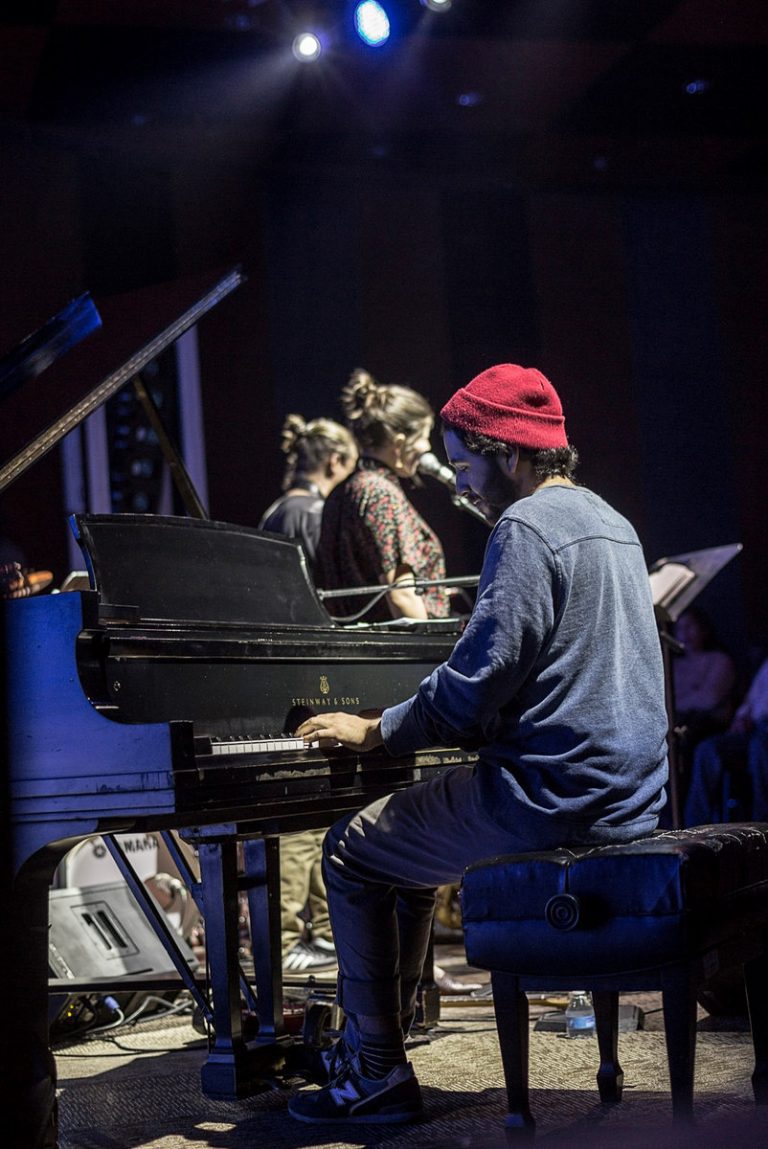Additional Information
Experimental jazz pianist and composer Emilio Reyna originally cut his teeth in Mexico City, but has been slowly carving out a career for himself in Montreal. He’s studied piano at McGill University and his latest single in May, “Llegarán suaves lluvias” (“soft rains will arrive”), features a saxophonist from Montreal and two revered Mexican instrumentalists.
Reyna is the type who takes displeasure in genre labels. He realizes why his music is classified as jazz, but feels the label does not fit the live experience properly. His point is to create an experience that is musically technical, but also accessible for his audience.
Before his performance at the OFF Jazz Festival on Friday with his quintet, Emilio took the time to chat with PAN M 360 about his origins, love of improvisation, and what other music he has on the way.
PAN M 360: How did you get into playing experimental jazz music?
Emilio Reyna: I’m from Mexico City, but I took some lessons with a guy here and I’ve studied studied piano at Berklee, which was kind of a big deal in Mexico. And it showed me a lot of the theory, the piano playing, and I was able to learn a bunch of music, from the classics like Bill Evans and Herbie Hancock, and then somehow I ended up starting and studying music in Montreal. I guess when I came to Montreal I was already really into the jazz music path.
PAN M 360: And did you play music in Mexico City at all?
Emilio Reyna: Yeah, I grew up with some friends who were also interested in music and I started playing, kind of like prog-rock type stuff. I was very influenced by classical music, but I feel genres are a way to organize music in our music libraries. But it’s not a very accurate way to describe music, and I find they’re just symbols to help us organize stuff, but it’s really hard to actually describe the music with those symbols.
PAN M 360: Yeah, for sure. You’re playing the OFF Jazz Festival, but there is so much that falls under the umbrella of jazz music and it really changes every year.
Emilio Reyna: Totally. I agree, and one of the important things about jazz music is that its biggest element is improvisation. Musicians that play jazz have to approach it as composers and have a very deep knowledge of harmony, rhythm, composition and melody. Improvisation is like composing in the moment, and I find jazz music is this amazing gift, you can just take elements from any genre and make it.
PAN M 360: Right, and you have to play with musicians you trust, and have them trust you.
Emilio Reyna: The guys I’m gonna play with Friday are people that I grew up with, studying at McGill. I have a lot of confidence and trust. I’ll be able to stretch out, and everything’s gonna be fine. They will follow, or I will follow whatever they come up with.
PAN M 360: Are some of those players on the recording “Llegarán suaves lluvias”?
Emilio Reyna: No. One of the guys, Ted Crosby, the saxophonist, he was in Montreal. I met him in Montreal when we were studying at McGill, but he just moved to Toronto. And the other two guys are Hernán Hecht, who has a huge trajectory in Mexico City as a drummer and Benjamin Garcia is a great bassist.
PAN M 360: So now that you’re playing it with different players live, it must be different every time?
Emilio Reyna: Oh, yeah! I would argue that every time that you perform any type of music, even if it’s classical music where every note is written, there are so many things you cannot translate in the scores. It only comes alive when you play it live. And again, in jazz music, because of that element of improvisation, there’s a regent structure and form in the kind of theme with melodic or rhythmic or harmonic parts. But once it’s actually played, I would say it’s a unique thing of the present moment.
PAN M 360: And what about naming a piece of music. I find that also influences the theme?
Emilio Reyna: Yeah, I mean, it depends. Sometimes I do have a concept in mind that for the certain type of composition, there’s like a motive driven by that concept. But sometimes I find naming a tune is really hard, and at the same time, very relevant. There’s no right and wrong.
PAN M 360: And some of your music has vocals in it. Are we going to hear that during Friday’s performance?
Emilio Reyna: Yeah, we’re gonna be playing with an amazing singer, Eugénie Jobin-Tremblay. She’s one of my favourite singers in the world and has her own project called Ambroise. She has a bunch of records that are so gorgeous. Her voice is very airy and kind of angelic, I find. She’s been a friend of mine for a few years and she’s gonna be singing in Spanish.
PAN M 360: Great. And you have a new album on the way?
Emilio Reyna: I have a few things im working on. So there’s a piano solo album that’s probably coming up in the next couple of months. I have a sextet album that has a couple of recordings, and I have a few recordings that I’ve been listening to and I need to decide what works and what doesn’t. It’s a very painful process to be honest because I don’t have a producer or label helping me to shape those things.
PAN M 360: And to be relevant now you need to always be releasing something or have immediate plans with things like Spotify.
Emilio Reyna: Yeah, and that part of the music industry … It’s great that we have so much music available from a few clicks on our computer or cell phones, but it’s quite different from what I grew up with. I find our attention spans have shrunk because we’re receiving so much information all the time. It’s here to stay and it’s gonna be part of life now, but I guess I’m still a little bit of a romantic, trying to adapt to the circumstances.
At Dièse Onze ( 4115 St-Denis) on Friday, October 8, 10pm, $15























